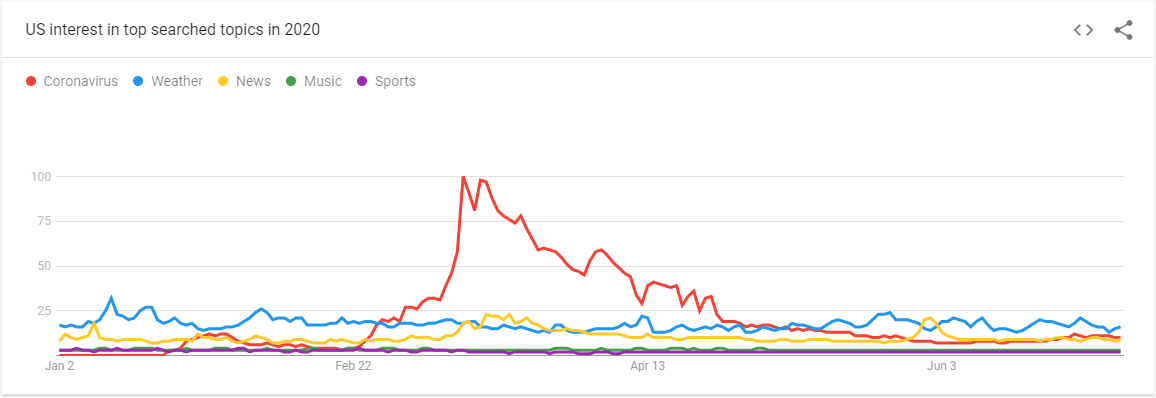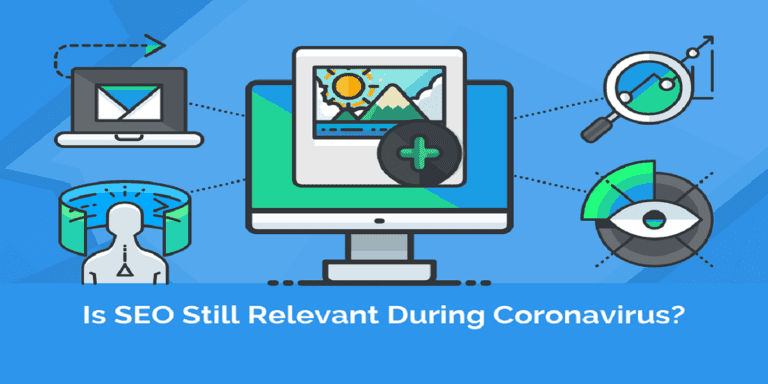There is no denying that consumerism has changed significantly in response to the COVID-19(Coronavirus) pandemic. Depending on your niche, you may have noticed changes in consumer behavior that have impacted your bottom line. Whether it’s been positive or negative, it has likely sparked a need for change.
As per 716-labs, A lot of change in business practices have been seen and, it means websites are getting even more importance in SEO, sales and marketing puzzle.
Considering the corona pandemic situation, websites must adjust design and development structure like enhancing ecommerce capabilities or adding more scheduling and logistic deals etc
As with all the other aspects of business operations during coronavirus, you may need to adapt your SEO strategy to best suit the demands of users at this time.
If coronavirus fallout has had a negative impact on your business, you might be tempted to cut down on your marketing budget, and in some ways, you can. However, SEO should remain a priority. Having a strong SEO strategy can be especially important to help your business survive through these uncertain times.
Additionally, if your business is doing well, there’s further incentive to maintain your SEO to continue to grow your business and remain on top of the competition. This may even be your opportunity to climb the ranks if your competitors pull back on their SEO during this time.
The key takeaway is that, while it might seem like there’s no end in sight for COVID-19, things will eventually go back to normal and it’s essential that your business is first choice for consumers when they decide to spend.
Is SEO Important Right Now?: What the Experts Are Saying
The impact that coronavirus will have on your business performance largely depends on the industry. For example, according to MarketWatch, tourism, restaurants, entertainment (movie theaters, comedy clubs, etc.), and more have seen dramatic changes in consumer behavior, meaning their revenue has taken a hard hit.
Based on WordStream’s dive into major trends caused by COVID-19, many non-essential businesses like these have seen decline in traffic.
However, according to the U.S. Chamber of Commerce, other businesses such as delivery (food and beverage, meal prep, etc.), liquor stores, and fitness equipment companies, are thriving.
And with the increase in users who are becoming more comfortable with search as they rely on Google and other online sources for COVID-19 updates, there’s a new opportunity for these businesses and others to take advantage of this growing audience, now and in the future.
Regardless of whichever end of the spectrum you fall on, whatever you do, do not panic when it comes to your SEO—says Search Engine Journal—because if you do, you could find yourself facing a major challenge when things return to normal.
As you likely know, achieving and maintaining a high ranking in search doesn’t come easy. Pulling back now could have long-lasting damage to the progress you’ve made, meaning you could end up falling behind.
How to Refine Your SEO Strategy
While you don’t want to make serious cuts to your SEO budget, some changes to your strategy may be necessary in order to best serve users throughout the pandemic and beyond.
Let’s dive into how you can go about doing just that…
- Analyze consumer behavior: If you have an SEO team, they should be on top of this. Otherwise, you will need to do a deep dive into your website analytics.
- Keep track of trends: In addition to your website’s user activity, you also want to keep tabs on search trends including keywords and themes you can apply to your content to make it more relevant.
- Prioritize usefulness and relevance: For many companies, their audience isn’t ready to make a financial commitment, but if you do a good job of prioritizing usefulness and relevance, they will be more likely to return when they are ready to spend.
- Focus on acquiring new customers: Creating content designed for individuals who are earlier on in the sales funnel, diversifying your marketing channels, and updating your ads can help you acquire new customers.
- Don’t let local SEO fall off your radar: Above all else, don’t let SEO fall off your radar. When the fallout of coronavirus has your attention divided amongst a variety of business needs, don’t get distracted from your overall business objectives and the role of SEO in achieving those goals.
You can also use our SEO checklist as your guide if you want to use this time to get an upper hand on your competition.
Focus on content creation
One of the greatest opportunities for businesses right now is bringing in high-quality leads. In a time when website traffic is down for many businesses, those who are making their way to a company’s site are likely very interested in the product or service they provide—or at least find the content they’re creating valuable and relevant to them.
Coronavirus has been trending and may be for some time. This gives you an opportunity to potentially reach a new audience of users who are searching for coronavirus content, including answers to their questions.
You can incorporate COVID-19 and other key terms into your content of FAQs to provide value to your audience. That said it is bound to curtail off, despite spikes in interest over the next few months.

While taking advantage of trends—such as searches related to COVID-19—and tying them into how they relate to your business is valuable, you shouldn’t put all your resources toward this type of content. In fact, many SEO authorities, including WordStream, stress that evergreen content is always going to be the priority and this content is a good investment.
As you can see in the example below, you can create blog posts that do both. This post by ShareAble for Hires has created a piece of evergreen content that also utilizes the term “pandemic” through the post to make it relevant, without dating its usefulness.
In addition to creating high-quality, evergreen content that helps build trust and engage readers, you also need to optimize your posts—this includes SEO image optimization.
Change trajectory as needed
Invest the time in researching trends and competitor analysis. Seeing what other businesses are doing to stay relevant when consumers may not be spending as much can be used as a guideline for your plan.
Depending on what you’ve been doing in terms of SEO strategy, you may need to change trajectory in certain areas, including:
- Paid Search: In addition to potentially cutting back on your paid search marketing, you may also need to tailor your ads to the current climate. Play into consumers’ concerns, needs, and interests during this time.
- Marketing Channels: With consumers spending more time online using a variety of social media platforms, search, and more, it’s important to diversify your marketing channels based on your audience.
- Email Marketing: Encourage customers to return to abandoned carts and shop on your site in general. Keeping your brand at the forefront of their mind is essential and email marketing campaigns can be an especially helpful tool right now.
In addition to SEO, other areas of your marketing budget will also need some reconsideration, including display ads. With an increase in Facebook traffic and a staggering increase in internet usage, this is an ideal opportunity to utilize display ads for remarketing.
Conclusion
In conclusion, yes, SEO is still relevant in the age of coronavirus. Not only is it relevant, but it’s essential to the survival of your business through the changes in consumer behavior and to its longevity once the pandemic has passed.
Implementing the above recommendations are a good starting point to adapting your SEO to help you maintain relevance and acquire new leads or customers. If you absolutely have to cut back SEO resources during this time, think carefully and plan thoroughly to minimize the damage done to your business.

